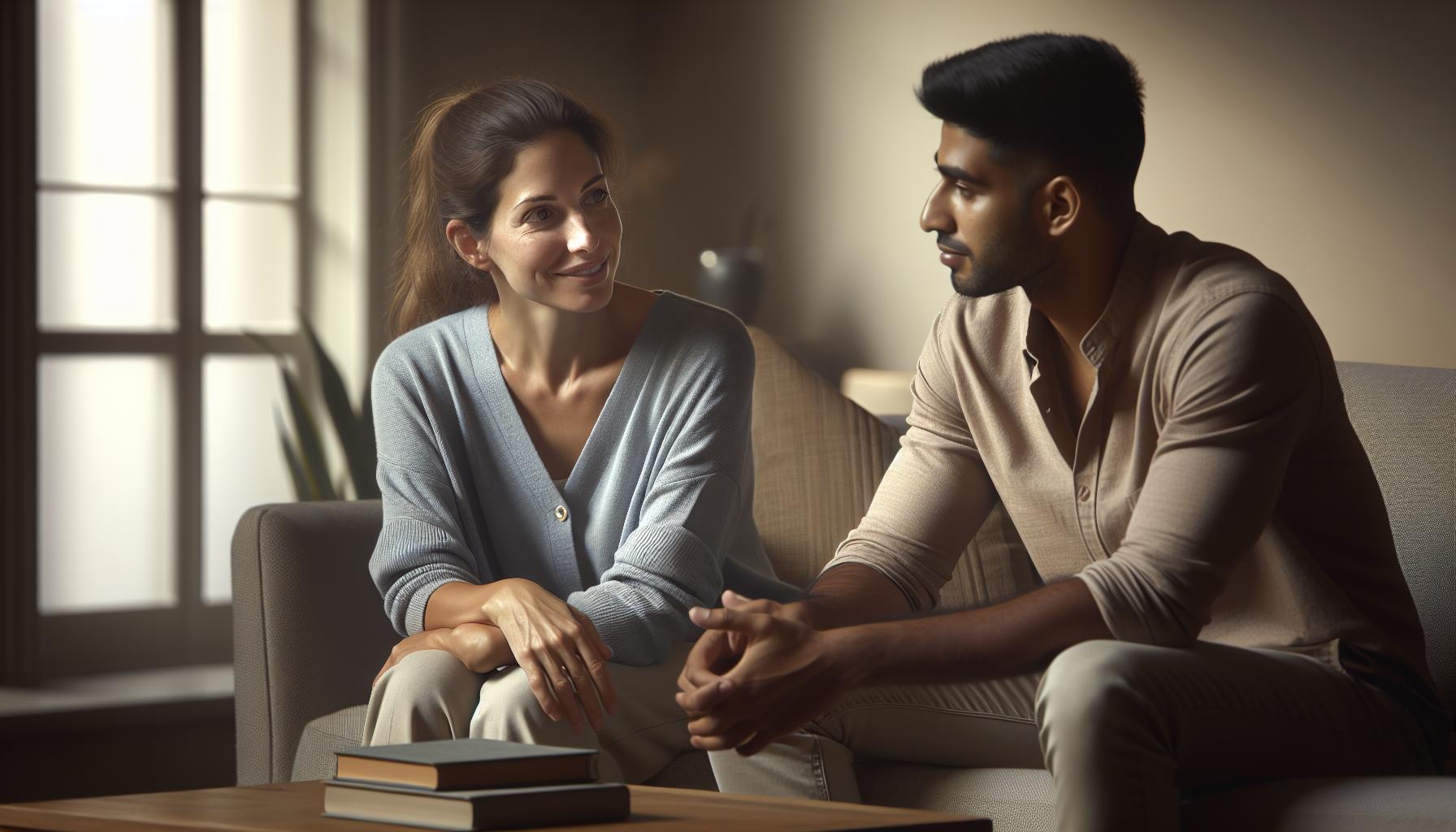Navigating the waters of love can feel like a high-stakes game of Twister. One wrong move and you could end up in a tangled mess, wondering how you got there. Relationship counseling questions serve as your lifeline, helping couples untangle their feelings and get back on solid ground.
These questions aren’t just for the lovebirds in crisis; they’re a treasure trove of insights for anyone looking to deepen their connection. Whether you’re trying to figure out why your partner leaves dirty socks everywhere or how to reignite that spark, asking the right questions can open doors to understanding and growth. So grab a comfy chair and a cup of coffee; it’s time to dive into the delightful world of relationship counseling questions and discover how they can transform your love life.
Understanding Relationship Counseling Questions
Relationship counseling questions serve as vital tools for uncovering underlying emotions and thoughts. They foster open communication between partners, allowing them to express feelings more freely. Insightful inquiries can deepen understanding and encourage empathy.
Counselors often utilize specific questions to guide discussions effectively. Examples include inquiries about individual needs within the relationship, such as, “What do you need from me emotionally?” These questions invite partners to reflect on their experiences and perspectives.
Additionally, exploring conflict resolution is crucial. Questions like, “How do you feel when we argue?” prompt partners to articulate their feelings and experiences during disagreements. Addressing these emotions can lead to better conflict management.
Another area of focus involves future aspirations. Inquiries such as, “What do you envision for our future together?” encourage couples to share their hopes and goals, fostering alignment and shared purpose.
Exploring past experiences can also prove beneficial. Questions like, “What past experiences shape your view on relationships?” allow partners to understand each other’s backgrounds, enhancing mutual understanding.
Ultimately, engaging in these questions transforms conversations. They nurture intimacy and connection, empowering couples to address challenges holistically. Regular discussions about feelings, needs, and goals aid couples in maintaining healthy relationships. By prioritizing communication, relationships can thrive even amidst difficulties.
Importance of Relationship Counseling Questions

Relationship counseling questions play a crucial role in enhancing communication and understanding between partners. These inquiries offer opportunities for reflection and connection, fostering healthier interactions.
Building Communication Skills
Effective communication is essential in any relationship. Counselors encourage couples to ask open-ended questions that promote dialogue. Questions about feelings, such as “What makes you feel loved?” invite deeper conversations. Practicing these discussions helps couples articulate their emotions clearly. As partners express their thoughts, they can develop empathy towards each other’s perspectives. Strengthening communication skills reduces misunderstandings and prevents conflicts, allowing partners to engage more constructively.
Identifying Relationship Patterns
Recognizing recurring behaviors is vital for relationship growth. Relationship counseling questions often highlight patterns that may go unnoticed. Inquiries such as “What conflicts seem to happen repeatedly?” can reveal underlying issues. Identifying these patterns empowers couples to address challenges proactively. By discussing emotions during conflicts, partners gain insights into their reactions. Understanding their behavioral tendencies helps in fostering positive changes. These revelations pave the way for healthier dynamics and prevent future problems within the relationship.
Types of Relationship Counseling Questions

Counseling questions vary significantly in type, serving different purposes in relationship dynamics. Couples can benefit immensely from understanding these types.
Open-Ended Questions
Open-ended questions encourage expansive responses, allowing partners to express feelings and thoughts in depth. For instance, inquiries like “What makes you feel appreciated?” prompt discussions that reveal emotions. Couples can explore various experiences together, leading to improved understanding. This dialogue fosters a deeper connection. When partners articulate their needs openly, they create a safe space for vulnerability and honesty. Critical areas of discussion can include personal values and aspirations. Consequently, open-ended questions enhance intimacy and facilitate constructive conversations.
Reflective Questions
Reflective questions help partners consider their thoughts and emotions more deeply. Questions such as “How did you feel when I said that?” enable exploration of reactions and perspectives. Couples gain insights into each other’s feelings, enhancing empathy and understanding. Reflection often leads to significant realizations about relationship dynamics. Identifying key feelings and responses can facilitate healthier communication. By regularly engaging in reflective questioning, partners reinforce their emotional bond. Reflective inquiries also provide clarity on how actions affect each partner, making it easier to navigate conflicts.
How to Use Relationship Counseling Questions Effectively
Utilizing relationship counseling questions effectively requires careful consideration of the environment and the dynamics between partners. Success depends on both partners feeling comfortable and respected during discussions.
Creating a Safe Environment
Creating a safe environment encourages open dialogue. Couples should choose a neutral, private space free of distractions. A quiet room with soft lighting can enhance comfort as conversations unfold. Establishing ground rules promotes respect, ensuring that both partners listen without interruption. Acknowledging each other’s feelings fosters trust, making it easier to share vulnerable thoughts. Regularly revisiting these guidelines reinforces a commitment to supportive communication. By cultivating this secure atmosphere, partners increase the likelihood of honest exploration of their feelings.
Encouraging Honest Responses
Encouraging honest responses is essential for effective communication. Open-ended questions invite deeper reflections, allowing partners to express feelings fully. Phrasing questions with warmth and curiosity helps minimize defensiveness. Statements like “I’d love to understand your perspective on…” prompt openness, rather than closed-off answers. Celebrating transparency when it occurs reinforces positive exchanges. Regularly thanking each other for sharing can motivate continued honesty. Building on this practice helps create a culture of trust, where individuals feel valued and cared for in their responses.
Conclusion
Exploring relationship counseling questions can significantly enhance a couple’s connection. By fostering open dialogue and understanding, these inquiries pave the way for deeper emotional intimacy.
Regularly engaging in meaningful conversations allows partners to address challenges and celebrate their unique bond. It’s essential for couples to create a supportive environment where both individuals feel safe to express their thoughts and feelings.
Ultimately, prioritizing these discussions not only strengthens relationships but also empowers partners to navigate life’s ups and downs together. Embracing this practice can lead to healthier dynamics and a more fulfilling love life.





